#But most of the voting population are only as educated as the people they speak to
Text
Striking Today?
If you're staying home from school/work in protest of Israel, and don't have a physical protest to go to, and you have an election this year (cough America cough) today's a perfect day to research your ballots!
With this tool you can simply enter the address tied with your voter's registration and be shown your election dates and candidates; information about these candidates (such as a photo, their platform, or any previous political work) are listed.
Make sure you are registered to vote and, if needed, opt for vote-by-mail. Request off from your jobs on election dates if you can. The more research you do now, the better off you will be come election days!
(If you are not from the states and wish to share voter resources for your country in this post, please do so!)
(If you are from the states and have more important resources or tips to follow, please do so!)
#politics#global strike#palestine#there are a lot of house and senate seats on the line this year#so please look them up and vote in the right people#and ENCOURAGE YOUR YOUNG OFFLINE VOTER FRIENDS#Spreading word online only does so much and I understand social anxiety especially in political context#But most of the voting population are only as educated as the people they speak to
16 notes
·
View notes
Text
If anyone is curious about what is happening in Australia at the moment, today Australian citizens voted on whether or not there should be added to the constitution the need for the government to set up an advisory board made up of Aboriginal people and Torres Strait Islanders (Australia's indigenous people) so that they can bring forward issues affecting their communities as well as provide feedback on how new laws might affect the. The results of the vote was announced a few hours ago and it was a No, with over half the population deciding not to include this in the constitution.
The reason this inclusion in the constitution was so important is because of one simple fact: Australia is a very racist country. It pretends not to be, pushing a narrative of assimilation (for example, I remember ads about how we're "one country, one people" playing on tv when I was a kid, and many of the ads against voting yes focused on how "this voice would divide us").
The Stolen Generation only ended in 1969. If you don't know what this is, The Stolen Generation refers to a period in which the government forcibly took Indigenous children from their communities, families and cultures. These children were then taken to institutions, or adopted - being punished for speaking their own languages, and often being subject to abuse and neglect. Most of these children never saw their families again. Many indigenous traditions and cultural practices are passed down from generation to generation orally, meaning that The Stolen Generation led to a lot of traditions being lost.
The reason i'm explaining what The Stolen Generation is, is that it still massively affects indigenous people today. The Stolen Generation only ended 54 years ago, meaning that the CHILDREN taken from their families are still very much alive today, and the trauma they experienced still affects their communities. There's a massive gap in education, employment, etc between indigenous and non-indigenous peoples.
The Stolen Generation isn't the only contributor to Australia's culture of racism, or the systematic racism here; but I wanted to inform people about it because it makes a point and spreads awareness about Australia's history.
This no result is a sobering reality check. The advisory committee would have meant issues such as Black deaths in custody, and the gap could have been prioritized by the government.
Australia is still very much racist. People are still uneducated on the difference between equality and equity. People don't want to put in the work to make the world better and decolonize their minds. The government still doesn't give a shit about it's people. Misinformation is rampant. Fearmongering is rampant.
176 notes
·
View notes
Text
Israel is the ultimate Omelas
I always thought that Israel was a perfect microcosm of the duality of man because on the one hand they had brutal oppression and on the other it had all those brilliant futurists and scientists, and a great healthcare system that had one of the best responses to covid.
It always baffled me how those two things could coexist in the same country. How those brutal stories of oppression and books of revolutionary thought could be coming from the same place.
Now I'm realizing that this kind of makes it the perfect tyranny.
In totalitarian states like the Nazi dictatorship or sovjet communist states, the population was severely oppressed. We associate the Nazis with blind obedience but actually there was an assassination attempt on him every few months or so, 42 in the 12 years he was Dictator. Bastard kept surviving due to bad luck, like a speech being cancelled due to rain or some intern moving the suitcase with the bomb. The Nazis demanded total obedience and would execute people for speaking French or drawing modern art.
Then there is the USA's corporate rule - not as bad as dictatorships maybe, but much of the population is dirt poor and know their options to vote for are largely corporate stooges. They don't have health care, decent education or consumer protection, so they have reasons to resent their taxes being used for war.
But Israel? The population lives in one of the most advanced utopias on earth! There is healthcare, luxury, culture, even relative freedom as long as you don't say "palestine". If you don't go in the westbank, you don't realize what's going on. The insidious trick of what segregation does is that it keeps the oppressed out of sight.
If you really want to be ignorant, you can probably manage to stay that way, comfortably, and live with all the same comforts as Swedes Canadians and Japanese.
The tyranny does not touch you unless you become a soldier or there happens to be a resistance attack near you, and even in those cases, the propaganda machine has comforting answers for you. Or at least, you're told that ending the tyranny means destroying your utopia - if it's you or a stranger, many people will pick themselves their lifestyle and their family.
Of course the big lie here, or the point where the analogy totally breaks down, is that doing away with appartment and giving equal citizen rights to everyone will not actually do away with the world-class universities and hospitals or even safety... indeed you'd be safer if you didn't keep producing angry traumatized people by butchering their families. It's a false dichotomy. A trap that presents the status quo as some lesser evil.
Euro-americans are fine without Jim Crow laws; Germans did not perish without conquerring Poland; Afrikaners are fine without apartheid - indeed the former disenfranchised people are still catching up economically exty years later. There should probably be affirmative action or reparations, once Palestinians get equal rights.
Nationalism is a myth cooked up as recent as the 19th century. Historically there have never been "pure, unmixed" peoples. People mix and trade and emigrate and copy each other, as long as people have been. You are going to have to live with people different from you & share with them. It's ok. The rest of us learned that lesson too (albeit imperfectly and often at a great cost; The EU is not clean-handed at all and is unforgivable fucking up in many ways as we speak) - No one needs ethnostates. No one is entitled to ethnostates - not Germans, not Euro-Americans, not Hindus, not the Japanese, not Israelis. Ethnostates do not make you safe. Moreover: Ethnostates are not practically feasible.
Look at the area slightly east of where I live and all the bloodshed that came from being unable to draw a line so that all Poles are on one side & all Germans on the other. And now there's still Poles living here and not even a real border anymore. If only we could have made the EU straight away instead of having all those wars, displacements & slaughter!
One day in the far future when there is peace ppl will look back at today and ask "why didn't they stop it sooner why all this waste?"
Eventually you're just gonna have to SHARE the god damn country. Like EVERY OTHER COUNTRY on earth that has multiple languages, religions and ethnic groups.
The Rwandans managed to make peace! And in that case there wasn't even a detachment of technology involved, ppl killed their neighbors (and those who refused to participate in the killing) with bare hands and machetes. But it's a prosperous, orderly country now. They opened many malls recetly & had a great response to covid.
It can be done. There's nothing special about the middle east. People there are not uniquely depraved, the region has been stable & prosperous before.
7 notes
·
View notes
Text
Reconstruction
So apparently both likely republican candidates have - in likely a feat of pathetic dick-waving - vowed to end birthright citizenship in the USA.
Now.
Let’s be clear: this is a profoundly anti-immigrant stance. It’s a racist stance. And given that the USA is, in actual fact, a nation of immigrants, it’s a deeply anti-American stance.
If it were to go into effect - somehow - it would be absolutely catastrophic. That the USA does not have eternal migrant populations, generations of people born without a state, is one of our greatest strengths. It doesn’t happen fast enough for the racists, but everyone who comes to America becomes part of the country eventually. And no, I’m not offended that I might encounter someone who doesn’t speak English.
In practical effect, since the POTUS does not have the power to end birthright citizenship, it will be to make the country still more hostile to immigrants, legal and not. It will have a chilling effect on the tech industry which relies heavily on H1-b immigration (this is an issue on which I have mixed feelings: I have no problem at all with people who seek higher education and come here to get a better life; I loathe the companies who abuse this system to have a source of indentured servants; I abhor that we maintain the fiction we cannot fulfill these needs domestically but also do not want to keep this apparently irreplaceable talent. But I digress.)
Yet, I want to look briefly at why the POTUS cannot end birthright citizenship: it’s enshrined in the US Constitution.Which in theory means that not only is it impossible for the POTUS to end, it’s functionally impossible for Congress to do so;that would require a Constitutional Amendment, and the current political environment renders that, well, impossible.
And we should look at the text and context of the amendment. First, the text, being section 1 of the 14th amendment:
All persons born or naturalized in the United States, and subject to the jurisdiction thereof, are citizens of the United States and of the State wherein they reside. No State shall make or enforce any law which shall abridge the privileges or immunities of citizens of the United States; nor shall any State deprive any person of life, liberty, or property, without due process of law; nor deny to any person within its jurisdiction the equal protection of the laws.
Now, this is a Very Big Deal, as it’s one of the parts which guarantees due process, among other little things. It’s also one which assured black people have citizenship; it overrides the “grandfather clause” loophole some states were using (if you’re not familiar, this meant that if your grandfather was a citizen, you were a citizen or could vote, or some other privilege, without having to undergo onerous and often impossible tests. And it meant that former slaves weren’t simply “not slaves” but citizens.
So, undermining the 14th amendment would in fact be an important step in bringing back slavery - which, yes, the rightwing (and extremist libertarians) do low-key want. You know... “states rights”. And it would be an important step to strip citizenship from large swathes of the population.
But they can’t repeal it, right?
The thing about laws is, they’re just things people say. And they just have a meaning we agree on. And they’re only important insofar as people care to follow and enforce them.
In this case, they like to use a novel (okay, batshit fucking insane) “interpretation” of “subject to the jurisdiction thereof, “ which it that only applies to people who are in the USA legally as permanent residents. So an asylum seeker, an illegal resident, someone on a visa.. they’re not, nor are their children. This is, as I’ve said, a completely ridiculous argument, but it’s one they’re making. It could also, in theory, be extended to anyone who is the child of someone like that, going back a long ways - in other words, since most black people in the USA are descended from slaves, they might be stripped of citizenship. Anyone descended from someone who didn’t get the right papers signed when they entered the USA (or, you know, lost those papers or had them destroyed) could face loss of citizenship. Granted, this will only happen if that person faces sufficient official scrutiny. You know, like if someone should be protesting or organizing.
Would the current SCOTUS endorse this theory? Well, one would think they would not - it’s destructive even to republicans - but Clarence Thomas is bought and paid for, and the rest of the republicans on the SCOTUS have not shown much of a relationship with ethics or concern for the country. So... yeah.
Is this alarmist? Maybe. But... gonna be honest, I don’t think so. This is American fascists trying to sculpt our country into a dystopia of their choosing.
3 notes
·
View notes
Text
nov 28 - Idle No More 2012
PRE LECTURE / HOT TAKE
In 2012, I was eleven years old and only remember hearing about this social movement in passing from my parents. I definitely had no idea that flash mobs were involved. The Kuttner reading paints a beautiful picture of the round dances and other celebratory acts of resistance. Kuttner describes this scene as a powerful visual symbol. These round dances remind me of the carnival at the Battle of Seattle! Very cool to see an overlap of fun-like tactics!
I enjoyed the documentary aimed to inform Canadians of the major pillars of the Idle No More Movement. This short video highlights the systemic barriers Indigenous people face, which lead to an ongoing health crisis. I think that the folk in this video are inspiring because, despite government oppression, these people are standing up for what is right.
Chief Theresa Spence from Attawapiskat went on a hunger strike that lasted 44 days. This reminds me of the women who fought for their right to vote. This tactic is powerful as it draws the public's attention. However, it is dangerous as one could experience severe health consequences. While Chief Theresa Spence was not force-fed like the suffragettes, she was hospitalized for dehydration and determination. This shows how dedicated these women are to their causes.
My hot take is not shocking, but I think many people agree with it. I think that as someone who benefits from these systems as a white, educated female, I need to educate myself on the historical relationship Canada has with Indigenous people and listen to those who are telling their stories. I think that is essential that indigenous voices are being uplifted to avoid situations where people are speaking on their behalf because often those privileged with opportunities to speak are telling stories that are not theirs to tell.
POST LECTURE / MODERN DAY CONNECTION / REVISED TAKE
I am floored by "Trick or Treaty" I have never considered HOW treaties came to be. More specifically, it never occurred to me that Indigenous people most likely did not understand what was going on because treaties are a colonial practice, and they did not speak English. How could Indigenous people understand what cede, release, surrender, and yield meant if they did not speak English? I am shocked to learn that the diaries of those acting on behalf of the crown admitted to the differences between the oral and written treaties.
Additionally, I had no idea that the band council was an imposed structure. I naively assumed that this was the way that Inidengious people operated. I am especially saddened by imposing structures into these communities that may not have operated in that manner.
I did not realize pre-lecture that these issues that people advocate for affect us all. Serpent River, Grassy Narrows, the "cancer alley" of Aamjiwnaang, Fort Chippewyan and the Debeers mines near Attwaspiskat are crises that affect us all. We have one planet we must take care of it! However, as more non-indigenous folk get involved, I am reminded of a quote from the Occupy Wall Street AL Jazeera video in which one of the interviewers said something along the lines of " it took white girls getting pepper sprayed to care." In other words, people only seem to care when white folks are involved.
I think that this week connects to OWS in that one of the elements of the logic of the swarm is the principle of listening to your neighbourhood. This matters because local info leads to a global swarm, and global support is needed to tactile this human rights and environmental issue.
My modern-day connection is Greta Thunberg's climate activism. While she is not an indigenous person, she struggles to be heard as she is part of a population (youth) whose opinion is deemed unworthy of consideration. Greta too, needs to rely on tactics like the logic of the swarm to sway public opinion.
In class we were asked where are we now? The women who founded Idle no more say that the movement is still going strong. I think this is true as there are more conversations about taking on decolonization. In response to this question, my revised take is that we need to break down what decolonization means and not simply use it as a buzzword. There are a lot of calls to take on decolonizing practices, but not a lot of conversations about what this looks like for different institutions. To figure this out, we must connect with indigenous people.
0 notes
Text
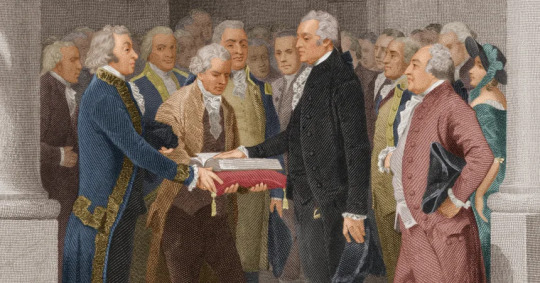
The inauguration of George Washington as the first President of the United States. Stock Montage/Getty Images via History.com
I know, I know: facts mean nothing when up against belief held fast, but I’ve had these considerations of rights on my mind for some time now, so I’ll let it fly.
Let’s us remember that when this country was founded, only the landed gentry -- White propertied men (think Washington, Jefferson, the Adams’ et al) -- could vote. Many if not most of those who worked on the Constitution believed that they were the only ones who were qualified to run for elected office, and the only citizens who were smart enough to understand how to vote and who to vote for.
(There was a belief among some of those “Founding Fathers” that a well educated electorate would be good for the country, practicing “enlightened self-interest,” which is knowing when to act as an individual, and when to act for the good of the whole polity. How the citizenry of the late 1700s saw their relationship to each other within their social milieu was rather different from the individualism that has come to the fore since the Founding.)
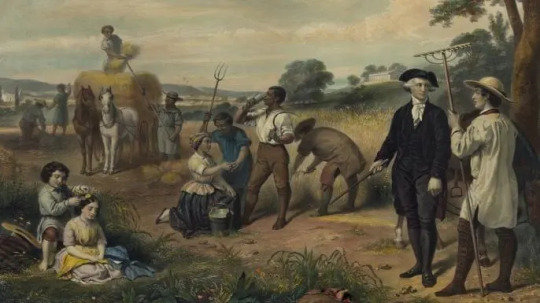
Washington standing among African American field workers harvesting grain. Buyenlarge/Getty Images via History.com
Let’s remember that in the years before the American Civil War, a good number those propertied men held wealth that included chattel slaves, and maintained their power by holding the elective offices in their states, and they didn’t want just anyone to be able to vote as they might very well lose power. They had the power of office because they had long since convinced their peers and fellow White men that they deserved to hold office -- because they were White and wealthy. It was a living, historic example of the “golden rule:” he who has the gold makes the rules.
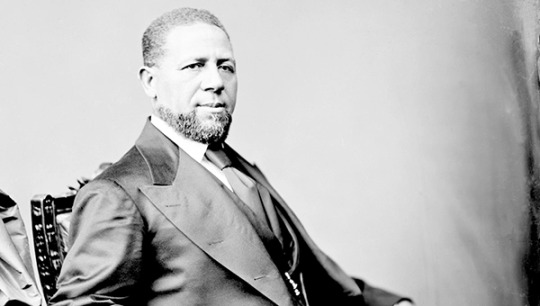
Hiram Rhodes Revels, first African American to serve in Congress (1870) in United States history via Vicksburg Post.com
Let us remember that for one short span of years -- during Reconstruction -- the propertied gentry were not the only men who held office. From local to state to national office, those who had been voiceless -- White and Black alike -- voted to make changes. Alas, those changes were overturned -- “redeemed” as some of the un-Reconstructed would have it -- for the sake of the old way of doing things -- not just in the South, but in the North as well.
(During the heyday of the 2nd Ku Klux Klan during the Interwar Years, Indiana had the largest number of dues-paying members, with Ohio, Illinois, Colorado and Oregon coming in just behind -- as well as significant numbers in Wisconsin and Pennsylvania. There were more Klan members in “the North” than “the South” for a few years.)
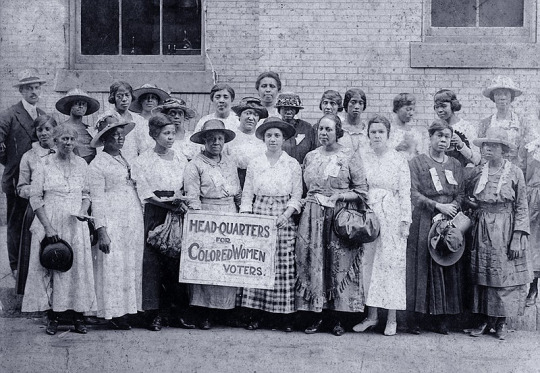
“Head-quarters for Colored Women Voters” via adl.org
Let’s remember that women acted to gain votes regardless of an individual’s sex -- an idea that found inspiration in Indian communities (which had seen women as “full citizens” in practice long before colonization and settlement) and was coupled with the ideals of equality before the law for all as proposed by Black women. Even as the idea for suffrage for women took hold, roughly half of the (White) women in this country didn’t believe women should have the vote as it would supposedly denigrate them and ruin the nation. It was not seen as a woman’s proper role.
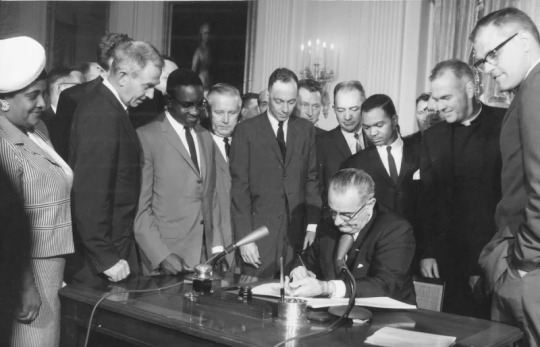
President Lyndon B Johnson signs the Civil Rights Act in a ceremony at the White House, Washington DC, July 2, 1964 . PhotoQuest / Getty Images via Time.com
Let us remember that it took nearly a century -- from the demise of Reconstruction until the mid- to late 1960s (and, supreme historical irony, the centenary of the Civil War) -- for Blacks and other non-White people to convince enough White people that even minority populations -- including all women -- deserved to be seen as having the same rights and privileges before the law as the majority.
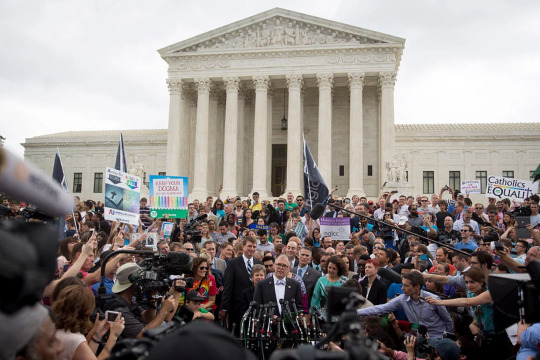
James "Jim" Obergefell, named plaintiff in the Obergefell v. Hodges case, bottom center, speaks to the media after the same-sex marriage ruling outside the U.S. Supreme Court in Washington, D.C., U.S., on Friday, June 26, 2015. Andrew Harrer / Bloomberg/Getty Images via NBCNews.com
That is -- they weren’t given any rights, rather it was recognized that they had those rights by virtue of being citizens of the United States. At least, that deserved-ness was acknowledged as being a legitimate claim, even though many of their fellow citizens continued (and still continue) to act as if such remains illegitimate, wrong, and deleterious to the continued existence of the country.
Every citizen, born or naturalized, has the same rights before the law. If someone is recognized as actually, after all, having those benefits, they are not being “given” anything, and that recognition does not diminish the rights of anyone else.
I recently heard it said (you’ll forgive me if I can’t recall who was being quoted here) that democracy is as much or more a matter of faith as any religion: those who participate have to believe that it works, and believe the results to be valid -- otherwise it all falls apart. The United States’ system of governance has frequently been referred to as “an experiment,” an acknowledgement, if only by inference, that it can fail -- as experiments so often do. The Republic, and the democratic actions that support it, have never been the same from one generation to the next across the centuries of the nation’s existence -- it’s always a work in progress.
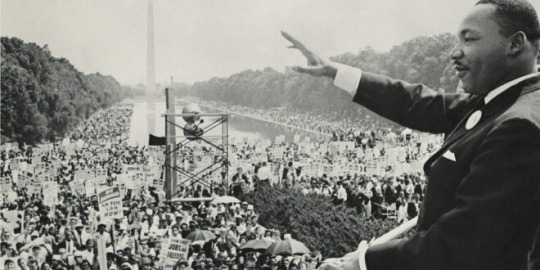
Dr Martin Luther King, Jr.’s on the steps of the Lincoln Memorial in Washington on 23 August 1963 where he made his iconic “I Have A Dream” speech. Universal Music via theafricancourier.com
Martin Luther King, Jr., uttered an oft quoted phrase: “the arc of the moral universe is long, but it bends toward justice.”
Given what I’ve witnessed, I’ve come to think that arc may bend toward justice, but down here on Earth, justice is only attained if enough people grab on and pull towards it.
#rights#human rights#rights in america#voting rights#these united states#History!#rant-ish#lgbtq rights
0 notes
Text
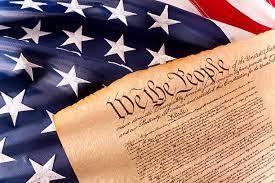
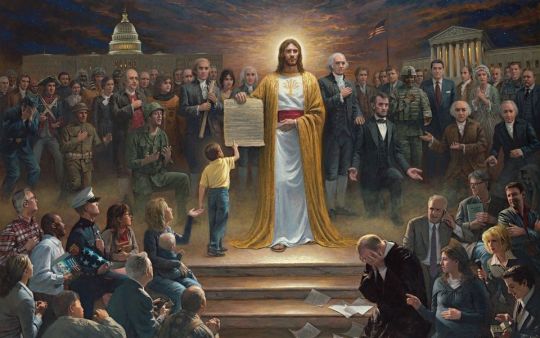


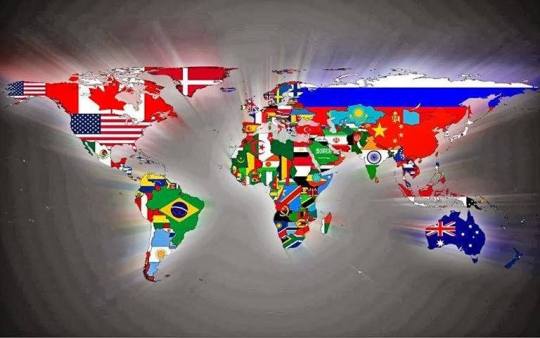
2024 Election
The responsibilities of the President of our country are as simple as that of the governor, the mayor of some town or city somewhere, or a large business down the street. Our great nation is the largest most powerful and most prosperous empire in the history of the world—the history of civilization, that we have been going downhill for the past forty years notwithstanding. Our great nation consists only of 5% of the world’s population. Yet we collectively possess 41.6% of the world’s total wealth and consume an estimated 25% of the world’s productivity (standard of living). If the entire world enjoyed the same level standard of living as we do, there would not be enough to go around. Just think about that. In past years before today’s technology, instant communication, etc., we could get away with that. How long do you think this condition can continue to exist today? How long can our poor continue to be rich relative to our poorer neighbors? Think of China with a population of 1.3 billion as compared to our 330 million and their relative level of poverty.
But I digress. The position of President of the United States of America under our Constitution, the richest, most powerful nation in the history of civilization, is the most responsible in existence and is not fillable by just anybody. It is so responsible, every move he (or she) makes; every word he or speaks must be measured, controlled, truthful, and responsible as to cause and effect. He must be capable to envisage any strategy through to the end, even before he begins. He must be educated, knowledgeable, wise, and emotionally stable—a leader. Donald Trump, Ron DeSantis, and others who are not that person in any way, shape, or form. To the contrary, unfortunately, it is proven fact and obvious to anyone who will look with an open mind, that they are intellectually lazy, unsatisfactorily educated, and emotionally unstable, some may even be seen as socialist extremists. Just as bad, if not worse, they are one-man shows. They are not leaders. They lack any semblance of leadership skills or integrity. In one decade, this nation has become increasingly divided. Almost, if not all, major positions within his areas of responsibility have turned over more than once and/or are temporary. This is neither leadership nor good management in our states and at the federal level. They are not trustworthy and tantamount to a loose cannons. They do not serve this nation. They serve only themselves in obtaining votes from not only the ignorant but also the mentally ill.
As presidents, governors, and mayors of the United States of America, they must be better reviewed, evaluated, and scrutinized or go.
Let us clear up one matter right from the start—the argument that I, like others, am mad because I don’t like Donald Trump, Ron DeSantis Nicky Hailey, Lindsey Graham, Mitch McConnell, and Ted Cruz; I lost my vote; my opinion is “sour grapes”; and I just want to get rid of him because I lost. Hogwash—pure Hogwash! I have lived through thirteen presidents—Franklin Delano Roosevelt thru Donald John Trump, and have not one-time advocated impeachment for reasons of “sour grapes”— ever! Donald John Trump, as President of the United States of America, is a threat to our country, to our people, and the whole world. I don’t give a damn about his sex life, his religion, his personality, or his looks—or, just now, his political party. What I do care about is his ability to lead our country through these perilous times; and, any way you choose to look at it, he doesn’t have it, evidenced by his performance over the past decade as well as his performance before he was elected (for those who want to get ahead of their preconceived opinions and look at his record—it’s all there if they will only put forth their effort to look).
Again, this is not a Democrat or Republican issue, our country is in jeopardy. This is a crisis. Donald Trump, Ron DeSantis, and others mentioned in the foregoing paragraph must go and go now. I warned you in the past years but received no response. This is your life, your country, and, as a citizen, your responsibility. It is also the life of your children and grandchildren for all generations to come.
Respectfully,
Steven P. Miller
@ParkermillerQ,
CEO and Founder of Gatekeeper-Watchman International Groups
Sunday, April 23, 2023
Jacksonville, Florida., Duval County, USA.
Instagram: steven_parker_miller_1956,
Twitter: @GatekeeperWatchman1, @ParkermillerQ,
https://twitter.com/StevenPMiller6
Tumblr: https://www.tumblr.com/blog/gatekeeperwatchman, https://www.tumblr.com/gatekeeper-watchman
Facebook: https://www.facebook.com/StevenParkerMillerQ
#GWIG, #GWIN, #GWINGO, #Ephraim1, #IAM, #Sparkermiller,#Eldermiller1981
0 notes
Text
In the Czech Republic’s presidential election last weekend, retired Army Gen. Petr Pavel took 58 percent of the vote, overwhelmingly defeating business tycoon and former Prime Minister Andrej Babis. Pavel served as head of the Czech Army and later as chair of the NATO Military Committee, second only to the alliance’s secretary-general. He campaigned on a promise to deliver stability. Babis, who held office from 2017 to 2021, now leads the opposition ANO party and is facing an investigation on charges of tax evasion and money laundering.
Babis’s loss seems to follow a tide turning against global populism, including the defeats of former Brazilian President Jair Bolsonaro and former Slovenian Prime Minister Janez Jansa. As prime minister, Babis mishandled the Czech Republic’s COVID-19 crisis and became known for his soft spot for authoritarian Hungarian Prime Minister Viktor Orban. The combined effects of the pandemic and Russia’s ongoing war in Ukraine seem to have boosted voters’ desire for some stability.
In times of peace, countries can generally cope with populist leaders for one or two terms, but such leadership becomes problematic in the face of overlapping crises. With Pavel’s victory, the Czech Republic shows that a truth-based campaign against populism can win. His presidency could mark a shift in Czech politics.
The president’s office will now come back into alignment with the center-right government’s policies. Importantly, Pavel also plans to focus on the grievances of those who voted for Babis. And for allies in the European Union and beyond, the Czech Republic now faces a chance to become a very reliable partner.
For the first time since Vaclav Havel held office, the Czech Republic will have a president who is not a professional politician, which may be an advantage in a role intended to work across political lines. The country is a parliamentary republic, meaning its president has limited powers; but since its foundation in 1918, presidents have played an outsized role in domestic and foreign policy, usually in times of political crises. Pavel’s immediate predecessors, Vaclav Klaus and Milos Zeman, were both former prime ministers who used the office as a tool for their political aims.
Pavel has the potential to turn the page. As a former military leader, he can appeal to people more easily than political elites. The Czech Army is now one the country’s most trusted institutions, whereas the public tends to doubt politicians. Before taking office, Pavel plans to travel to poor regions home to Babis’s support base and discuss possible solutions to structural social and economic problems, such as affordable housing shortages, limited job opportunities, and low levels of education. These regions include areas along the Czech Republic’s border with Germany and Poland, where the expulsion of the German-speaking population after World War II left long-lasting scars.
After graduating from the Czech military academy in 1983, Pavel joined the Communist Party of Czechoslovakia and led an airborne reconnaissance unit. He enrolled in intelligence training in 1988 but only performed the job later under democratic governance. Although his history with the Communist Party may have weakened his candidacy, it didn’t turn out to be decisive. Pavel’s broad support may indicate that the Czech Republic has reconciled with its past, especially given his 30 years of service to democratic governments.
Pavel rose quickly in the military ranks after the end of the Cold War, winning the French Legion of Honor for leading a unit that rescued 53 French soldiers under siege by Serbian troops in Croatia in 1993. His accession to the presidency is a clear sign of the rehabilitation of the Czech Army, which once had a reputation as an enabler of the communist regime. Pavel’s post-1989 commitment to liberal democratic values personifies the Czech Army’s transformation into a valued ally within NATO and a respected force at home.
Pavel’s military experience quickly came up during the campaign, as Russia’s war in Ukraine became a key election issue. Early on, Babis called the retired general a warmonger and called for peace in Ukraine—mirroring both Orban and former U.S. President Donald Trump. Babis also hinted at a plan to organize a peace summit at Prague Castle and went as far as saying he wouldn’t agree with dispatching the military if Russia attacked the Baltic states or Poland. (Hours later, he walked this statement back, adding that he would honor the obligations of NATO’s Article 5 on collective defense.)
The Czech president doesn’t make decisions about the country’s military engagement, which is left to the country’s government. Pavel called only for continuing Prague’s support for Kyiv to avoid further aggression from Moscow that could come even closer to the Czech border. Nonetheless, democratic forces elsewhere should pay close attention to future Czech presidential contests, as Russia’s war in Ukraine will certainly appear as a key issue in future elections. A divisive campaign like Babis’s might work in a different context—such as neighboring Slovakia, where early elections are expected this year.
The Czech president is expected to represent the country abroad, giving the role some influence over foreign policy. Petr Kolar, Pavel’s chief foreign-policy advisor and the former Czech ambassador to the United States and Russia, said in an interview that the new president will respect the constitution and closely coordinate with the cabinet. Although that may sound obvious, it isn’t in the context of Pavel’s immediate predecessor, Zeman. The outgoing president used political crises to form his own caretaker government and often resisted prime ministers’ cabinet proposals.
Under Pavel, the Czech Republic will further solidify its position as Central and Eastern Europe’s liberal democratic stronghold. His election is bad news for Orban, who will become further isolated as he loses allies Babis and Zeman. In an unprecedented gesture, Slovak President Zuzana Caputova traveled to Prague to congratulate Pavel on the day of his election, suggesting potential for synergy between the two countries—at least until the Slovak parliamentary elections. Poland also expressed satisfaction with Pavel’s election, given his stated support for Ukraine.
Pavel won’t bring much change to the Czech Republic’s posture toward Russia. Since Russia’s invasion of Ukraine, Prague has been among Kyiv’s top supporters, including with weapons shipments. (The Czech Republic was the first country to deliver tanks, attack helicopters, armored vehicles, and rocket launchers to Ukraine.) One of the president-elect’s first calls to foreign leaders was with his Ukrainian counterpart, Volodymyr Zelensky. Pavel will become active in coordinating with allies on aid to Ukraine; he and Caputova already discussed a plan for a joint visit to Kyiv in the spring. On Wednesday, Pavel told the BBC that Ukraine should join NATO “as soon as the war is over.”
One should expect some adjustment to the Czech Republic’s position on China and Taiwan. The Beijing-friendly Zeman laid obstacles like government efforts to recognize Taiwan’s economic importance on the one hand and condemn China’s human rights record and aggressive foreign policy on the other. Pavel is already showing his colors: On Monday, he spoke with Taiwanese President Tsai Ing-wen. (China promptly condemned the call. Czech diplomats have reiterated that Prague’s China policy remains the same.) Pavel also tweeted that he hopes to meet with her in person, and the speaker of the Czech Parliament, Marketa Pekarova Adamova, is planning an official trip to Taiwan in March.
Pavel is pro-Europe and knows Brussels well, both from his time as a Czech deputy military representative to the European Union and later as NATO Military Committee chief. European Commission President Ursula von der Leyen called the president-elect both a European and an Atlanticist, according to Kolar. The two leaders are likely to build on previous contact from when von der Leyen was Germany’s defense minister. When it comes to participation in summits, the current division of labor will likely continue: Czech Prime Minister Petr Fiala will attend EU leaders’ meetings and Pavel will attend NATO summits, unless they agree otherwise.
Finally, Pavel will certainly energize the Czech Republic and the wider region’s trans-Atlantic ties. During his military career, he worked alongside U.S. colleagues, including serving as a national military representative to U.S. Central Command in Tampa, Florida. He can also rely on the friendship and advice of several U.S. generals, such as retired Lt. Gen. Ben Hodges, the former commander of U.S. forces in Europe.
With Pavel’s election, Czech allies are getting a predictable partner. He isn’t the kind of politician making promises that he can’t keep but rather a leader who will follow through on his commitments. Czechs now have three years without major elections, and the president and Parliament appear to be aligned on liberal democratic values—presenting a unique opportunity to become a regional anchor. Although Pavel may be a less dramatic president than his predecessors, that could be a positive thing in a parliamentary republic, reflective of a government working as it should.
1 note
·
View note
Text
Open Access Journal of Addiction and Psychology (OAJAP)
Addiction and Violence Prevention in the United States
Authored by Christina Pinard*
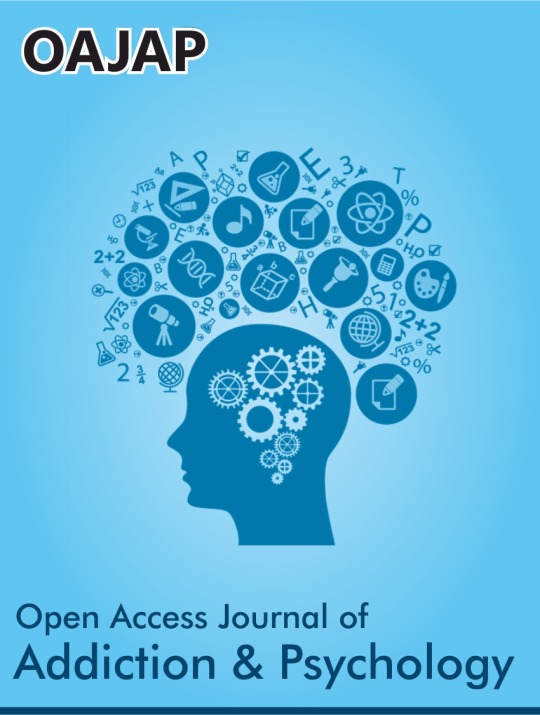
Guest Editorial
Violence prevention includes deliberate measures to prevent acts of violence. Data Collection: National Crime Victimization Survey [1] notes that violent crimes include murder, assault, sexual assault, robbery, and rape and the Federal Bureau of Investigation [2] identifies that violent crimes rose from 2013 to 2017, making violence prevention a necessary undertaking. Haskell R, et al. [3] discusses that there is a correlation between substance use, mental health and violence; and, while only some of mental health and substance abusers are violent, there is a link between abuse and trauma in their lives.
Lozano-Verduzco I, et al. [4] conducted a study to better understand the experiences of patients regaining violence prior to their rehabilitation. The results of the study indicated that all participants experienced violence at some point in their lives and the most common types of violence reported were emotional violence, economic, physical, and sexual violence. Women are more susceptible than men to experience violence, which increases with substance use. It is important to note that violence affects all communities, but disproportionately affects the adolescent population and people of color. Violence is not limited to women and children-men too can be victims. The Mayo Clinic Staff [5] discusses that domestic violence, also known as intimate partner violence, is difficult to recognize in men, so knowing the signs of abuse are crucial. There are staggering statistics speaking to the serious of violence in the United States. According to the National Coalition Against Domestic Violence [6], 1 in 5 women and 1 in 71 men in the United States has been raped in their lifetime. Also, 5.1 million men in the United States have been stalked in their lifetime, 1 in 4 men have experienced some form of physical violence by an intimate partner and 90% of children exposed to domestic violence are eyewitnesses to the brutality [7].
The physical effects of violence can include broken bones, bruises, and internal bleeding. However, while the physical impacts of violence are well known, there are economic and mental effects too. The abused may be forced to give his or her abuser their paycheck. Also, many times, victims must take time off of work to deal with the abuse he or she endured, which may cause a loss of revenue. The mental burden of violence can be draining as well. Depression, anxiety, suicidal thoughts and post-traumatic stress disorder are all effects of violence [5]. The World Health Organization [7] reviewed prevention programs and found that while measures are taken to focus on prevention, measures still fall short in making the necessary impact; notably mentioning that violence can not only be predicted, but prevented too. Sound prevention measures are needed to keep men, women and children safe from violence.
There are ways to advocate for violence prevention. You can help to increase awareness! The very first step is to educate yourself on violence prevention. Next, help community members recognize abusive patterns and breaking the cycle. The cycle includes the abuser threatening violence, physical violence, apologizing and promising to change with the offering of gifts, and ultimately repeating the cycle [5]. Encouraging victims to create a meticulous safety plan can be the difference between life and death. Support victims in getting help from the police, religious organizations and mental health experts. Attending bystander intervention trainings can be immeasurable when faced with a situation. Another way to help is by voting for policies that promote measures to minimize gun related injuries and work with your community to create violence prevention initiatives and supporting law makers that discuss plans to help reduce violence.
To read more about:https://irispublishers.com/oajap/fulltext/addiction-and-violence-prevention.ID.000569.php
Indexing List of Iris Publishers: https://medium.com/@irispublishers/what-is-the-indexing-list-of-iris-publishers-4ace353e4eee
Iris publishers google scholar citations:
https://scholar.google.co.in/scholar?hl=en&as_sdt=0%2C5&q=irispublishers&btnG=
0 notes
Note
I'm probably digging myself a very deep rabbit hole right now, but can you please explain the basic timeline of the French revolution? Because American education is terrible and I never learned anything about it beyond that it was important and inspired the American revolution and a couple of other ideas. I would love to know more so I can understand your memes.
I'll try not to make this too long and rambling.
So for centuries France was ruled by an absolute monarchy. This monarchy was getting increasingly detached, and they and the nobility kept raising taxes on the third estate (everyone not a noble or a clergyman). As this was happening, the Enlightenment was going on, with thinkers like Rousseau and Montesquieu questioning if society really benefited from having a king.
The king at the time of the revolution, Louis Capet (AKA Louis XVI) was very poor at managing money. He sent tons of financial aid to America in their war of independence, and never was paid back, among other bad investments. His wife, Marie Antoinette, came from Austrian nobility and was a strong advocate for financial conservativism (keeping the nobility far above the rest in terms of money and assets).
The Estates General was called as an advisory body, but a skewed voting model gave the small minority of the population (royals and clergy) a profound advantage, so delegates of the Third Estate broke off and met in a Tennis Court, declaring themselves a National Assembly and preparing to draft a new constitution that gave them a fair say.
In July of 1789, Louis dismissed Jacques Necker, his minister of finance, who was more pro-Third Estate than most of the court at the time. It was the straw that broke the camel's back, and when the king refused to listen to the citizens, a group of them stormed the Bastille in search of weapons and gunpowder. Camille Desmoulins (later to be a famous journalist) was among them.
Eventually, the king was forced to cave to the Assembly, and they instituted a constitutional monarchy similar to England at that time. The Third Estate had more powers, and the king had less. He was no longer an absolute ruler.
Louis Capet didn't like this, and neither did his wife, and this will be important later.
In rural areas, peasants began to rise up against wealthy lords. The Constituent Assembly- a new governing body- voted and declared the abolition of feudalism and the tithe (goods payed to the lords). The king tried to veto, but the Parisians marched to Versailles and forced the royal family to come back to Paris.
Political clubs had begun to circulate around this time. From the Feuillants (fairly conservative constitutional monarchists) to the Jacobins (mainly republicans) and to one of the most radical, the Cordeliers (radical democrats, one of the only clubs to allow women to speak), people had begun to take part in their local politics. The Jacobins in particular would skyrocket in popularity.
New financial measures, such as the assignat, were also put into place to try to curb the debt. Some land was redistributed. France was divided into new sections to facilitate voting. Louis Capet, again, was not happy with this.
Some nobles began to leave the country- the emigres. They realized public opinion was turning against them, so they booked it. Many of them went to countries actively hostile to the Revolution, and took state secrets with them. This caused alarm amongst the French citizens.
War broke out between the French and the Austrians in 1792. (Robespierre and Marat, the radical journalist both opposed it, but they were not listened to.) Suspicion began to grow that Louis Capet and Marie Antoinette were secretly siding with Austria, due to the fact that Marie Antoinette's brother was the king there.
Eventually they caught the king and his family trying to flee. They found a cache of incriminating letters, particularly between Marie Antoinette and her brother. The rumors were true. The king was put on trial for treason.
Eventually, they executed the king for treason. (Despite being generally against the death penalty and trying to have it abolished earlier, Robespierre did support the king's execution, as he posited that the king was too great a security risk to be left alive.) France was declared a republic, and the Convention (a new incarnation of the Assembly) no longer had to answer to any monarch. One of these Conventionists was Saint-Just, a 25-year-old who had made an impression with his speech shortly prior to the king's trial.
The war wasn't going well at that point, and fingers were being pointed at the Girondin faction, an offshoot of the Jacobins that had been the most vocally pro-war. Marat was particularly fierce in his condemnation of them, which led a Girondin woman named Charlotte Corday to murder him in his bathtub. This led to the people being more convinced that the Girondins were traitors, as Marat was a beloved and popular public figure.
Eventually, after members of the Gironde were caught trying to flee their posts, several of their leaders were executed for treason and many were expelled from their seats on the Convention.
Around this time, the Committee of Public Safety (and the Committee of General Security) was formed to deal with the escalating war situation. It has twelve members originally, but this eventually dwindled to nine. Robespierre and Saint-Just were among the people chosen.
Representatives were sent out on mission to war fronts or to put down province revolts. Many of these representatives committed excessive acts of violence, such as Fouche, Tallien, and Collot d'Herbois. This will also be important later.
Marie Antoinette was also tried and executed for treason, because of her collaboration with Austria.
A new constitution was now in the process of being drafted, and it held some of the most egalitarian principles yet. Saint-Just and Heuralt were both involved in its drafting, but it would never be implemented due to the war and the eventual coup of Thermidor.
Fights broke out between deists and advocates of state-sanctioned atheism. A compromise was proposed in the form of the Cult of the Supreme being, basically a doctrine that encompassed all religion. Robespierre, a deist himself, was heavily involved. However, the COTSB was not very popular or successful amongst the atheist deputies, and became an object of mockery to them.
The Law of Suspects passed and increased the amount of crimes that could be considered treason. Another law, 22 Prairial, followed it. This had been aimed to reduce unwarranted executions in the provinces but had the unfortunate side effect of overloading the Parisian justice system, leading to a spike in executions in early 1794.
One faction, ultra-militant radicals associated with Jacques-Rene Hebert, another journalist, was caught trying to plan for an insurrection as they wanted to intensify the policy of 'terror'. Hebert and some others associated with him were executed.
Soon after, Fabre d'Eglantine, a member of the more moderate Indulgent faction, was caught in a financial fraud scheme. Also implicated was Danton, who had been a prominent figure since the outbreak of the revolution. Desmoulins, an ally of Danton, was caught up in it by association. All three as well as a number of others were guillotined. Being a politician was very dangerous in this time, and there were numerous assassination attempts.
Robespierre stopped coming to work. It's highly likely that the execution of Desmoulins- a once-close friend of his- as well as the turbulent political system had harmed his mental state, and he was also suffering from bouts of ill health. In his absence, members of the government began spreading rumors that he was plotting to turn public opinion against them and have them killed (he did not have the power to do this).
He returned to his job and was met with outright hostility. He gave a hastily-composed speech that only worsened the problem. Saint-Just attempted a reconciliation but neither side was willing to cooperate and he was forced to pick a side. He sided with Robespierre even though distancing himself from him would've been safer.
This culminated in the coup of 9 Thermidor, where Fouche, Tallien, Barere, and some others violently declared Robespierre and his allies under arrest. They tried to escape to the Convention hall with the help of the municipal Paris government, but they were eventually trapped in the Convention hall by opposition troops. Many were injured in the scuffle, including Robespierre. The next day, he and his allies were guillotined too.
The conspirators formed a new government, the Directory, and began stripping back many social progressions that had come to existence in the revolution. As was mentioned earlier, many of the conspirators were those who had committed huge acts of violence and were worried that Robespierre and his allies would expose them. Robespierre had a reputation for being 'incorruptible'- you couldn't buy him out or use personal connections to keep him quiet, and that made him dangerous to those with so many dirty secrets.
I believe the revolution ends here, in 1794, with the coup of Thermidor, but some historians include the years of the Directory up until Napoleon in it.
...I said I'd keep this short, didn't I. Well. So much for that. Sorry. Hope this was what you were looking for.
45 notes
·
View notes
Text
one of the most impactful things I have read lately are two of French author Edouard Louis' books, Pour en finir avec Eddy Bellegueule and Qui a tué mon père (translated into English as The End of Eddy and Who Killed my Father). It's been two months and I'm still thinking about it.
The first book is an 'autobiographical novel' about the author's childhood growing up as an obviously gay boy in one of the poorest areas of France, until he leaves and reinvents himself as a writer. It's fraught with bigotry, abuse, bullying, violence, deprivation and social despair, and it's one of the most harrowing things I have ever read. It reads as many things as once : a recognition of trauma, an angry exorcism, a cry for society at large to pay attention, and to be honest, as a horror story.
It was criticized by some in France as portraying the working class in a manner that was too negative, which tells me they missed the point entirely...ironic for a book by someone who actually grew up poor - one of my least favorite things ever is progressives telling a marginalized person they can't talk about their own experiences because they don't fit the desired mold. (The French love to romanticize the working class and I'm pretty sure it's often an avoidance mechanism.)
The point of the book is so obviously not about 'look at how terrible and bigoted those poor people are'. Little Eddy spends a big part of the narrative trying to escape - himself at first, then his family/circumstances and the persistent homophobia everywhere. In the end of the book, he finally manages to get accepted into a fancy high school in the city on a scholarship and tries really hard to fit in. The last scene of the book is a bunch of his - educated, upper/middle class - classmates throwing homophobic taunts at him, starting the cycle anew. I can't think of a clearer way to say 'this is not a story about a sad gay boy escaping the evil bigoted countryside for the city and then everything was wonderful!!!! this is a story about a systemic, pervasive problem.'
One of the key arguments of the book, to me, is how homophobia, sexism and bigotry in general are both a product and a reproduction mechanism of social and economic exclusion. For instance, he describes how the norms around what it means to be a man in his village (being tough, disobeying authority, quitting school early to go work at the factory, drinking alcohol, neglecting your own health, fighting over women, repressing your feelings, etc) perpetuates the cycle of poverty ; but again this isn't 'oh these people are so stupid' and more 'these people are trapped'. Because he makes it evident how degrading and dehumanizing poverty can be, this masculinity reads as a desperate attempt to cling to a certain amount of dignity - it's an extremely dysfunctional coping mechanism. At the same time, anyone falling outside of the mold is violently ostracized (like Eddy, who tries and fails to fit in). So the system keeps reproducing itself.
In Who Killed my Father, the author makes his political argument clearer. This is more of an essay, centering on his father, arguably the most complex figure in the first novel. The man is an angry, bigoted alcoholic who makes his family miserable ; at the same time he is the son of an abusive father who makes a point of honor to never hit his kids or wife even though it's very normalized in this context. In this essay the author keeps talking about the moments of almost tenderness with his father that haunt him, the picture he has of him doing drag in his youth, the fact that the father tried to leave the village when he was young to find a better life for himself with a close friend but failed and had to come back - the moments of what-ifs, of trying to struggle free from the cycle, when the system appears almost fragile and not so unbreakable after all, that the son kept holding close like a sort of talisman.
The narrative is structured around the fact that his father injured his back working in a factory and that he had to keep doing physical labor afterwards for money, instead of resting to recover, until it completely destroyed his body. Now he finds himself bed-bound at 53. Louis inquires into who is responsible for this premature 'death'. After considering individual choices, he turns towards political decisions - the successive governments, left and right, who have been destroying the French welfare system for decades and accelerating inequality. The point is to step out of the neoliberal obsession with personal responsibility and who is guilty and who is a bad or good person, and look at systems.
An element that isn't focused on but hovers over the story constantly is that this village is one where the majority of the population consistently votes for the extreme right National Front party in most elections. The book is too angry and nuanced to be some stupid "it's not their fault that they're racist because they're poor!" argument. It doesn't make any excuses for how awful this is but instead illustrates how dehumanization replicates itself, how people being denied basic dignity leads to them wanting to deny it to others. If you want to really understand the rise of the far right you have to look at where the inequality comes from in the first place, and how easy it is for people in power to wash their hands of it by blaming the bigoted masses. (Just like you can blame societal ills on minorities ! Two for one strategy.)
Towards the end of the essay, the author talks about how proud his father is of his son's literary success - for a book who clearly depicts him as a horrible person ! And this is a man who has spent his life openly despising anything cultural, because it never showed him a life like his own. But maybe now he feels seen, now he knows people want to read about these things. Maybe there is a reclamation of dignity through looking at the horror head on. Maybe his son somehow slipping through the cracks of the cycle gives him more room. The man stops making racist comments, and instead asks his son about his boyfriend. Most importantly, he asks his son about the leftist politics he's engaged in. They talk about the need for a revolution.
I think what strikes me the most is this attitude of "wounded compassion" that permeates the book. What do you do when your parents are abusive but even after you grow up, you can't help but still love them, and you know they've been shaped by the system that surrounds them ? Recognizing, speaking the harm is essential. You need to find your own freedom, sense of worth, and safety. You need to dissect the mechanisms at hand so they lose at least some of their power over you. You need to find people who love and believe you. But then what? Do you dismiss your persistent feelings of affection and care for those who hurt you as a sign you're just fucked up in the head ? You could just decide to never speak to them again, and it would be justified, but is that really what is going to heal you the most? It's important to realize you have the choice. But there are no easy conclusions.
This makes me think of a passage I have just read in Aversive Democracy by Aletta Norval. The essential ethos of radical democracy, she says, is about taking responsibility for your society, even the bad parts, instead of seeing them as a foreign element you have to cleanse yourself of. It's too fucking easy for queer progressives, especially the middle class urban kind, to talk about dumb evil hicks, to turn pride into a simple morality tale, and forget that any politics that don't center the basic dignity and needs of people are just shit. The injury is to you and by you and you have a duty of care just as much as a duty of criticism. (And this is obviously not only applicable to class matters.) You can't just walk away and save your sense of moral purity. (This is not an argument that the oppressed are responsible for educating the oppressors ; it's about how privilege is not an easy simple ranking and it is too damn easy to only focus on the ways in which you are oppressed and forget the ways in which you may have more leeway.)
There is no absolute equivalence between political and family dynamics but the parallel feel very relevant somehow. Several truths can coexist at once : you needed help and it was not given. You were let down. It's important to recognize that people are responsible of how they treat each other. You need to call out what isn't ok and stand up for yourself. At the same time, there is a reason why things are like this. Making people into villains is often bad strategy (within reason!), and in the end, easy dichotomies are often an instrument of power. The horrors you have been through might have given you a very specific wisdom and grace you do not have to be afraid of ; you are not tainted by your compassion (it is very much the opposite of forced forgiveness ; it has walked through the fire of truth.)
To me these books fit into what French literature does best, sociological storytelling a la Zola or Victor Hugo - the arguments aren't new and they can come across as heavy handed, even melodramatic. But I'll argue that the viscerality is the point, how the raw experience of misery punches through any clever arguments about how exploitation persists for the greater good of society. Really worth reading if you can do so with nuance.
#edouard louis#french literature#france#queer culture#queer literature#lgbt books#bookblr#also just like the first book is a walking trigger warning in every possible direction so like careful#also the dude is literary buddies with ocean vuong and im curious to see if there are any parallels there#long post#poli sci
57 notes
·
View notes
Text
The Seixas Brothers; Jewish Patriots
A family of Portuguese origins and first generation colonial Americans- The Seixas family had a powerful influence on the Jewish communities of New York, Rhode Island and Philadelphia- particularly through the eldest two surviving sons. Moses & Gershom.
Being of Portuguese origin the family were Sephardic Jews. Sephardic Jews being Jews from Iberia and later the Middle East, post inquisition. They had different customs to the modern culturally dominant Ashkenazi Jews, Jews from Northern and Eastern Europe- an elder contemporary of the Seixas brothers would be Moses Mendelssohn who was a Berlin based Ashkenazi Jews who helped the cultural integration and gaining of civil rights for Jews in Germany then Prussia.
Religious customs between the two groups differed significantly particularly in language with Sephardic synagogues mainly being in Portuguese or Ladino when not speaking Hebrew. The Sephardi Jews also were seen as more refined and educated than the Ashkenazi Jews, as well as wealthier, in internal community dynamics. Hence the saying that the Sephardic Jews were the descendants “of Poets and Philosophers” see Judah Halevi or Maimonides as examples of a Sephardi Poet and Philosopher, from Spain and Egypt respectively. In Europe these communities were often segregated from each other, internally, seeing inter community involvement outside of business as distasteful. This included prayer & marriage.
The situation for American Jews were quite different. The community of the Seixas brothers was small roughly 2,500 people barely a tenth of the population. Practising it was Sephardic due to the influence of the Dutch Jews, yet it was majority Ashkenazi in cultural and ethno-religious make up. Leading to a community that was small, spread out, cultural mixed and frankly too modern for the European rabbinical practises.
Now; to the Seixas brothers themselves. Born and raised in Rhode Island by Issac Mendes Seixas; born originally in Portugal and raised in London by Abraham and Abigail Seixas who were Marranos (Jews converted to Christianity, who continued to practise Judaism in secret due to the Inquisition) and Rachel Levy born in London, she was an Ashkenazi Jew related to the important Levy-Frank’s family. Her marriage caused such an uproar that many Sephardi members avoided it. As you can see like many Sephardic Jews their marriages were from across the world, and like many York City Jews they began the intermarriage of Ashkenazi and Sephardi. You can see more of their records in the image of the family register attached below.
Sexias family register

The ideologies of Moses and Gershom were shaped by the world around them, Great Britain had one of the most lenient policies towards Jews however this included the fact that they could not attend university, own property in the form of land or practise the law. The Jews rights bill in England would not come til the mid 19th century. Anti-Semitism was often seen in the writers of the day including Voltaire and English politicians. The Seixas brothers were of Portuguese origins which conducted the inquisition that oft burned Jews alive for either not converting or being secret converts, post expulsion. In the 18th century this continued in Goa, India & Brazil.
Russia conducted pogroms, which devastated the Jewish community until the early 20th century (although Soviet Anti-Semitism was by no means better post 1920s). This was also the era of the Pale of Settlement in which Eastern European Jews were restricted to modern day Belarus, Lithuania and Ukraine unable to trade or live in any main city without a letter. Prussia, had begun the process of integrating Jews, however both sides were extremely cautious of the other.
The Middle East was mixed, on one hand it was more tolerant than Europe with Thessloniki being named the Shabbat City as it was mainly dark on Friday nights due to observance. Yet; Jews were also mistrusted in the Ottoman Empire having to be identified by dress often a yellow hat or a type of shoe (this identification also existed in different forms in East Europe). Religious persecution varied from region to region.
This was the time where Proto-Zionist thoughts were beginning, but it was mainly aimed at integrating in the current society. The idealogy popular among the American Colonial Jews (those with Wiggish leanings) was that the new state would allow for religious and economic freedoms in which they could be active, equal citizens of a country founded on the right of man to govern himself over a Christian or Muslim Monarch whose country saw them as deplorable. This is a bit of a history lesson but essential to understanding the context, in which these first generation Jews acted in who were likely spurred on by the revolutionary ideals and attitudes of the time, as well as their own.
Moses was born March 26th 1744 and married Jochebed Levy also of Newport. He was a merchant, operating from the city and a proud follower of the patriot cause, his main influence being post the war in his encouragement of Washington to uphold the religious freedoms promised. He frankly; asserted it, rather than requesting it.
Moses was a civic and religious leader, being an educated man who was apart of the Freemason’s in Rhode Island. He believed such institutions allowed natural brotherhood between men, no matter their background. Moses later became leader of the King David’s Lodge. He was also the warden of the Touro synagogue in Newport, one of the oldest in the country, founded in the 1760s. Warden was a civic leadership role in a religious community. He often spoke at community sermons, including reading his letter to Washington in 1790 aloud to the man and the community. He also wrote letters addressing Washington as a fellow freemason. Outside of religious and civic duties he also post war co-founded the Rhode Island Bank.
"a Government, which to bigotry gives no sanction, to persecution no assistance – but generously affording to All liberty of conscience, and immunities of Citizenship: deeming every one, of whatever Nation, tongue, or language, equal parts of the great governmental Machine." - Moses Mendes Seixas in his famous letter to Washington.
An interesting detail on Moses’s religious involvement, despite not being Hazzan like his brother, is the fact that in the 1770s he was entrusted by the Newport community to be the Mohel; The man who preforms circumcision on the eighth day of a Jewish boy’s life. He received instruction only by letter, and circumcised his own son successfully. It shows how well trusted he was in the community and also how Jewish communities in America often divided duties among each other due to the lack of Rabbinical influence and population.
Moses’s letter to Washington 1790
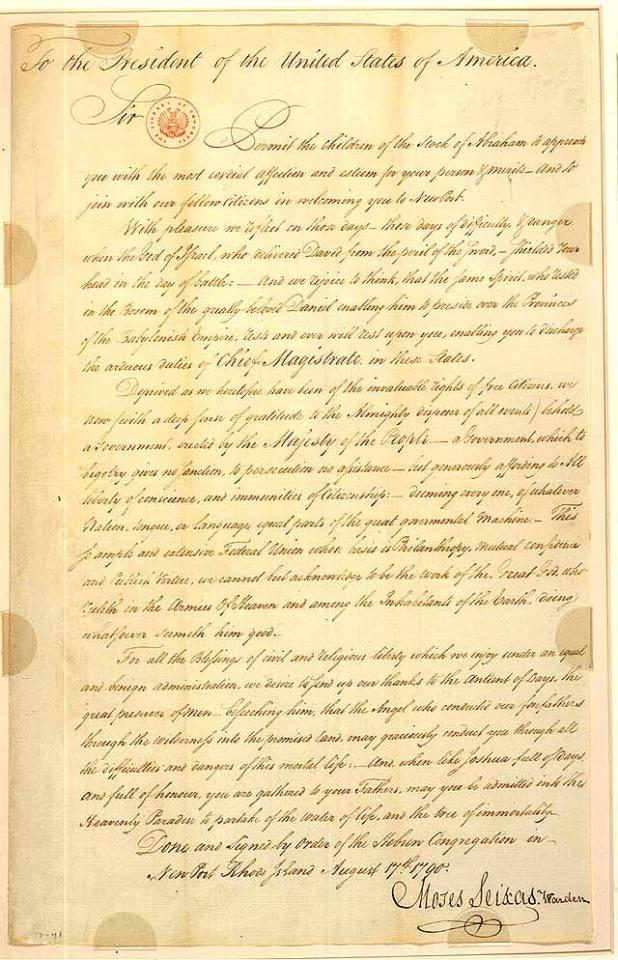
Last but not least, Gershom. I know the most about him due to what is avalible on his life, I have to admit this post is quite long so I will do a seperate one going into more detail about the younger brother.
Gershom Mendes Seixas was born a year after his brother and became Chief Hazzan of the New York community synagogue at the early age of 23. Despite being young for a role which was the nearest they had to Rabbi, he was voted unanimously which demonstrates the breadth of knowledge and charisma the man had. Hazzan, as Jews canted their songs, tended to lead the singing and the reading of the Torah in synagogue, especially without a Rabbi.
As a Hazzan he was simply revolutionary. Not just in his politics. He was the first Jew to have a sermon in America in English, with the majority of his sermons from there onwards being in English. He pressed for the reconciliation between England and the Colonies, however his tone notes a man who clearly saw England in the wrong and the Colonies as having bargaining power over their overlord.
From the start he was an interfaith leader, many of his friends being Tory Christians, he resumed many of these correspondents post war with those who remained. In 1776 he was extremely active, including writing a prayer in Hebrew for the reconciliation of the colonies, as referred above. When invasion of New York by the British came near, his emotive words convinced the entire congregation to board up the doors of the Synagogue with many leaving the city. During this time, his wife Elchalah suffered a miscarriage. He escaped to Connecticut with some of his followers, bringing the religious ceremonial items with him including the scrolls.
With the take back of Philadelphia he was offered the role of Hazzan there which he served until 1784, there he actively argued against Protestant lawmakers who proposed changes to the constitution such as ensuring that only Christian’s could follow it and that it was impossible for those of other faiths to comprehend, like his brother he civilly fought these matters stating that it was "unjust to the members of a persuasion that had always been attached to the American cause and given a support to the country, some in the Continental army, some in the militia, and some by cheerfully paying taxes and sustaining the popular cause."
He would be present at Washington’s inauguration as apart of the significant fourteen religious leaders that supported him, he was the only Jew.
Post the war he would continue to actively be involved in Jewish ceremonies, having an annual Thanksgiving sermon back in New York where he returned afterwards. He became the first Jewish member to be elected a trustee of Colombia collage. He would also create a Jewish charitable organisation in 1802 called Hebra Hased Ve Amet.
To this day descendants of both brothers serve as leaders of America’s remaining Sephardi community.

Portrait of Gershom Mendes Seixas 1784
#turn washington's spies#turn amc#American revolution#revolutionary history#Jewish history#Gershom Mendes Seixas#Moses Mendes Seixas#The Seixas Brothers#my American jewish history rants#please enjoy#this means a lot to me#if you have any information feel free to add#also I did totally listen to the old man's back again as I wrote this#turn washingtons spies
24 notes
·
View notes
Text
Task 1: Concept Mind Maps
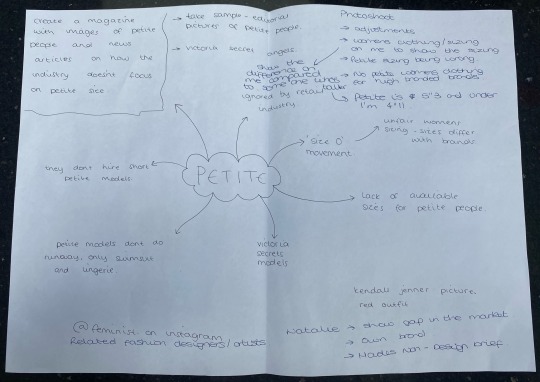
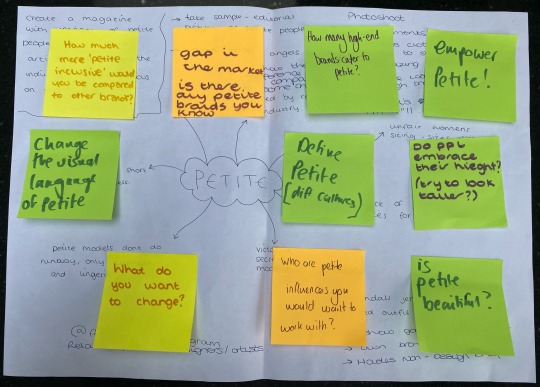
In pairs we produced a mind map of each others concept, for our final project, planning and considering how we can explore the following factors:
Research
Experimentation
Sampling
Development
Production
Personal Reflection/ Evaluation
Project/ Time Management
We was asked to write down our narrative on a piece of paper and swap with our partner so we had each others narrative. We then wrote down our ideas that came to mind related to their narrative, in order to help them with new ideas they may not have thought of or knew about. I really enjoyed this task as it helped me learn new facts about the petite world and I was able to complete lots of research. I always loved hearing about my peers narratives and their stories as to why they are focusing on a certain topic.
My completed research from this task:
Petite models -
After researching about types of work available for petite models I found out that other than Moss, most petite models do commercial and catalogue work. Models who work in fashion generally work with high street brands specialising in petite clothing. It is very rare for a petite model to find high-fashion work on the catwalk or for designer labels. This is something that I find unfair as your height should not matter. However, petite models are not restricted when finding work. This is due to an increase in brands catering for men and women with smaller frames and shorter legs, petite models are now employed to keep up with this fashion industry demand.
Successful petite models -
Models who have refused to obey the stereotypical image associated with top designers, catwalks and campaigns are creating a path for petite models. These inspiring successful models have completely ignored the height restriction demonstrating that a smaller stature is required in the fashion industry. “Successful petite models are making an impact in a tall girls stomping ground, ignoring the confinements set upon them.”
Twiggy -
A british icon in the sixties and only 5″4. She revolutionised the stereotypical look of the era, starting a new breed of supermodels. Her height is rarely mentioned due to her confident persona that demands attention. She is still the shortest model with such a supermodel status.






Beautiful dreams - Twiggy records her first single
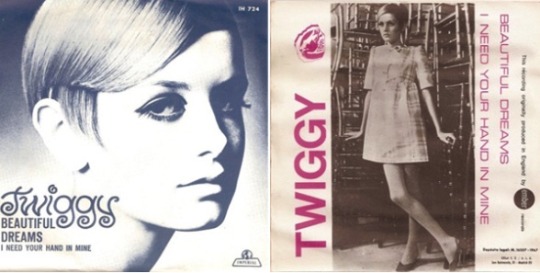
Anja Konstantinova -
Russian-Australian model, her impressive range of work includes, Vogue, Marie Claire, Urban Outfitters and French Connection. At 5″4 her height is not an issue with each shot demanding attention with her striking features, blonde hairs and natural posing instincts. The successful model discovered in a melbourne hair salon has received lots of rejection in her career, but she continues to break boundaries in a predominantly tall industry.
She explains: “People in Australia don’t accept shorter girls because they are a bit harder to work with, you have to photograph them in a certain way.”




How to make the most of your petite frame -

Don’t draw attention to your shorter height when interacting with clients and via body language. You will have to work extra hard to get noticed, which means standing tall and learning to highlight your height in photos. Never be caught slouching and be sure to work on poses that lengthen your lines. Good posture and strong stature goes a long way when presenting yourself to an agency meeting and photoshoot.
Petite models who changed the fashion industry -
Lily-Rose Depp
Lily-Rose made her runway debut with chanel in 2016. She is just 5″3, but that did not stop her from becoming the muse of fashion icon Karl Lagerfeld.

Amina Blu
This German/ Pakistani beauty is 5″1 and no stranger to New York Fashion Week. Amina has walked for Kanye West more than 5 times. With her unforgettable looks and signature looks, Amina will keep making headlines.

The ‘Size 0′ movement
Sizes range from 0-2 which is extra small to 14-16 which is larger. Smaller sizes are usually petites, and larger sizes usually found in womens or plus size departments.
The size-zero ban is proof fashion industry on finally listening to customers. The use of size zero models has been a fashion industry scandal for many years. France’s top fashion house have committed to stop underage and size zero models from featuring in catwalk shows and advertising campaigns. Owners of brands such as Saint Laurent and Louis Vuitton say they want to persuade others in the industry to follow suit. The industry has long been accused of promoting unhealthy body images of women and ignoring well-documented health problems experienced by models. In 2017, the French government voted through a law requiring models must have a medical certificate confirming they were not dangerously underweight.
“No model under 16 years will be recruited to take part in fashion shows or photographic sessions representing adults.” Models between 16-18 years will no longer be allowed to work between 11pm and 6am and must be accompanied by a parent or chaperone if required to stay away from home.
“The wellbeing of our models is a fundamental subject” the statement from LVMH read.


Mallory Schlossberg - “I’m part of a huge demographic that retailers largely ignore - here’s why it’s so frustrating”
When reading this article I very much related myself to it, she mentions being reminded of her height near enough everyday, she is 4″11 like me. “There are only a few times when I'm reminded how short I am: when I'm riding the subway and someone pushes right into me because I'm not in his peripheral vision, when I can't reach my kitchen cabinets and hop onto the counter, and when I'm shopping.”
When she was in high school and college she frequently shopped in the kids section. She mentioned it being impressive to see the selection that’s available for wealthy, stylish kids these days. She is able to wear a lot of designer apparel that are much cheaper than adult prices as kids clothes takes less fabric to make. However, it comes to a point in an adult woman's life where you do not want to shop in kids section anymore, she wanted to wear apparel for women because she is a woman. Adult size small dresses zip up just fine, but they hug in all the wrong places and drag on the ground or are longer fit on her than they’re supposed to be.
“It's frustrating. How do you shop for clothes and not look like a child in children's clothing — or a child playing dress up in her mother's closet?”
There are retailers that do cater to petite women although the ranges are very limited.
“Walk into Ann Taylor, Loft (where I buy my jeans), J. Crew, Banana Republic, or a department store, and you'll see selections of petite clothing, often relegated to a small corner with an odd amalgam of apparel, as though the merchandise team is wondering, "who is this petite woman? Is she a mother? Is she frumpy? Is she a decaying 90-year-old? Is she youthful and feisty? Is she too young to show off her curves? Is she a virgin?" The answer — from a petite woman — is that she is none of the above, and she is all of the above. The petite woman is just like the regular-sized customer...only shorter.”
Retailers seem very confused with how to deal with short women. Topshop and Anthropologie are starting to recognise that short women like to look fashionable too, but the lack of options and concern for petite shoppers is noticeable. The reason as to why there are fewer petite options and not all stores offer apparel for smaller-framed women is because it requires a different design pattern.
As blogger TanyaTheAnonymousModel wrote on Jezebel:
"For a dress to look the same on a petite woman, a standard size woman and a plus woman — for the hem to hit at the same place on each woman's leg, for the waist to sit at the appropriate height, for the neckline to flatter but not overexpose, for the pockets to be useful, easily reached, and neither too small nor too big — requires, in effect, three totally different paper patterns, each with a separate, and expensive, development process."
The Fashion Institute of Technology in New York City offers a continuing education course in image consulting, combining petite and plus size bodies together as "special size" customers — noting that they make up about a tremendous amount of the population. The course description reads as follows:
"Over 70 million U.S. women fall into the special size category, that 50 % of the population is actually under 5'4", and 65 million women are considered plus size. Designers, patternmakers, retailers, stylists, and image consultants, and wardrobe technicians can all benefit from this in-depth workshop that demystifies the special size business potential. Learn the facts behind the figures with practical information for fulfilling the expectations of the special size customer with proper fit, fashion, and service. Highly recommended for anyone looking to increase sales and services. Interact with our two industry experts as they each tackle the dilemmas facing both the petite and plus-size customer and give concrete directions for satisfying their shopping needs and fashion passions."
An undergraduate course "sketching for fashion designers" mentions that "Large, half-size, petite, and junior-size figures are featured to study proportions used in the industry". Showing petites aren't entirely ignored in design school, they just aren't given equal attention. They're generally not on runways; runways are about aspiration, and who aspires to be 5'2''?
“Petite women have not been celebrated loudly as equals. They have not been given body-positive model icons to speak on their behalf, although we do have Kelly Ripa, Snooki, and Kim Kardashian in our corner. There has not been a call to action. There hasn't been any real vocal repugnance, but instead, there's been a silence and a void, which is too telling. Petite women have been pushed aside, not permitted to speak — much like the children for which many try not to be mistaken.”
17 notes
·
View notes
Text
A case study in political astrology - the moon and sun as destructive forces.

The Tehreek-e-Labbaik is a fledgling extremist right-wing party with a powerful, blindingly charismatic Leo-stellium hold on Pakistan's public that's both fascinating and terrifying. At a moment's notice, the TLP is able to mobilise millions nationwide in a display of riotous anger. With its Moon in populist Aquarius, the TLP transcends party loyalties, sectarian rivalries, and socioeconomic barriers by tapping into the one thing my countrymen glorify above all else: no, not Islam - communal honour.
Since its formation in 2015, it has repeatedly campaigned for some nebulous restoration of a lost sense of religious 'honour', a cultural concept otherwise extended to women as vessels of communal purity. In doing so, they're acquiring political capital at a nationally unprecedented rate (Leo Jupiter conj. Leo Venus) by way of vague, radical, and populist messaging (Leo Mercury opp. Aquarius Moon).
In a country of over 200 million Muslims, no individual will claim to not love the Prophet (SAW), and the TLP knows this. They don't ask for political support, or even bother with campaign promises. They merely ask if you love Islam; if you do, surely you'll side with TLP. The cost of rejecting the party's ideology for any reason can mean social ostracisation, condemnation, and even death.
To me, this represents an increasingly terrifying side of the astrological lunar mother. Liz Green puts it beautifully:
“Because the Moon governs the realm of nature, a purely matriarchal consciousness dispenses with the value of the individual, giving absolute importance to family and to tribe, justifying the suppression or destruction of individual self-expression if the security of the group is threatened. There are no ethics or principles in this domain, nor any disciplined use of the will. All is justified by instinctual need and preservation of the species.” ¹
Pakistan, a country with its natal Moon and Mars in Cancer, already typifies a strongly, passionately lunar collective. It was birthed as a safe Cancerian abode for a population confronted with religious and political insecurity. Broadly speaking, our politicians have always known their best strategy involves speaking the public's watery 'love language' - protecting the homeland, protecting religion from western schemes, protecting women from Indian / Bengali harm, even protecting the global Muslim population as a whole (the cornerstone of the propaganda used to galvanise Pakistani civilians for the Afghan war.)
With nearly all its other planets clustered in Leo, Pakistan's cultural protectionism dons the guise of a staggering self-importance and communal pride. Admittedly, this is also the source of a great deal of the country's resilience, otherwise disadvantaged and cornered in nearly every conceivable way.
Decades of stoking this prideful regional 'white knight' complex are finally coming home to roost in the form of TLP. What we have today is a disenfranchised, forgotten, and fragmented public, aching for a collective Cancerian lunar law that speaks to their desire to be 'known' and 'recognised' in grand Leonine unison for something:
“The lunar side of us says, “This is my name, this is my family, these are my children, this is my patch of land, this is my country. This is where I belong.” Such things provide us with a collective identity and a sense of security within the group. Many people have a tremendously powerful need to identify with their historical roots, and suffer great anxiety if they are torn away from their place of origin.” ²
Can you guess where TLP's Mars (intent, passion, political impetus) is located?

Cancer.
At the heart of TLP's radical, disjointed offerings lies everything the public has been aching for since its birth, a blend of protectionist collectivistic pride it feels nurtured and warmed by. "We can all be united under the imperative of guarding the Holy Prophet's PBUH honour with all our might, and of revitalising the weakening status quo of Islam" (Moon in Aquarius strongly trine Uranus in Aries)
As a result, we're left with millions wrapped around TLP's wagging finger, as it trembles with petrifying rage at everything and everyone that won't immediately succumb to its pious demands.
Attempts to contain the party's influence are failing. TLP was banned from participating in political activities last month, but continues to campaign as an independent party in local elections, most recently garnering more votes than the incumbent government itself. (Pluto in Capricorn [power, control from the governing center] inconjunct its Leo Venus & Jupiter)
I'm presently of the view that the party has tapped into a lunar force and a solar catalyst so terrible and catastrophic my country will be left reeling from it for years to come.
The country's educated, wealthy class remains unaware of the velocity with which TLP's fiery, vindictive dogma is rippling through the general public. Its rage and its rhetoric is indiscriminating of previous party affiliations - anyone who loves the Prophet Muhammad SAW must join its ranks. It fears no one and demands total sublimation of the self, and cannot be contained by political repercussions, by logical dialogue, and even by military interference. It can merely only be suppressed until the next perceived religious misstep that allows it to rear its head, and grow exponentially once more - I tremble at the thought of what this growth is meant to culminate with.

¹ | ² Excerpts From: Greene, Liz. “The Luminaries: The Psychology of the Sun and Moon in the Horoscope (Seminars in Psychological Astrology, Vol 3).”
#astrology#pakistan#astro notes#aquarius#leo#cancer#sun leo moon aquarius#astro observations#zodiac#horoscope
11 notes
·
View notes
Photo

Beautifullll Frederick Douglass
“Douglass was born into slavery in February 1818, in Maryland as Frederick Augustus Washington Bailey. His mother, Betsy Bailey, delivered Frederick in her mother’s plantation cabin. Shortly thereafter, Betsy returned to the plantation where she worked, leaving Frederick with his grandmother. After only being able to see him a few times since giving birth, Betsy died when he was eight. At age 10, he was removed from his grandmother’s care and sent to live with another family; eventually, he would land on the plantation of Hugh Auld. Auld’s wife, Sophia, taught Douglass his alphabet and from that little bit of knowledge, he taught himself to read and write. Not long thereafter, Douglass was teaching other enslaved people how to read. Douglass would later say, "knowledge is the pathway from slavery to freedom.” When word got around that this former student turned instructor was teaching others to read, he was sold to a man known for being incredibly cruel to his “property.” After several attempts, Douglass was able to escape with some assistance of friends and a free African American named Anna Murray. In 1838, he traveled by train to New York to the safe house of abolitionist David Ruggles.
Once he arrived in New York, he sent for Anna, who he married. Unable to marry without the consent of his legal owner, he changed his name from Bailey to Frederick Johnson to avoid being discovered. Both he and his wife changed later their last name again to Douglass, after a character from the epic narrative poem The Lady of the Lake. The couple relocated to Massachusetts.
It didn’t take long before he became a leader of the abolitionist movement in Massachusetts and New York, gaining acclaim for his oratory and incisive antislavery writings. In fact, northerners of the time found it difficult to believe that Douglass had once been a slave. He was described by abolitionists as a living counter-example to slaveholders' arguments that slaves lacked the intellectual capacity to function as independent American citizens. He began his abolitionist work using his oratory skills to tell of his experience. His most famous work was Narrative of the Life of Frederick Douglass, an American Slave.
More than 50 years before the famous Plessy v. Ferguson case, in1841, Douglass and a friend were thrown off an Eastern Railroad train because Douglass refused to sit in the segregated railroad coach. He would join other abolitionists and they would travel throughout the Eastern and Midwestern United States speaking out against slavery and discrimination. There were occasions when he would be attacked by mobs as he spoke—the most brutal attack was in Indiana.
When he traveled to Ireland and England in 1845, he said he felt relieved of American racial discrimination. He wrote in his autobiography:
Eleven days and a half gone and I have crossed three thousand miles of the perilous deep. Instead of a democratic government, I am under a monarchical government. Instead of the bright, blue sky of America, I am covered with the soft, grey fog of the Emerald Isle [Ireland]. I breathe, and lo! the chattel [slave] becomes a man. I gaze around in vain for one who will question my equal humanity, claim me as his slave, or offer me an insult. I employ a cab—I am seated beside white people—I reach the hotel—I enter the same door—I am shown into the same parlour—I dine at the same table—and no one is offended ... I find myself regarded and treated at every turn with the kindness and deference paid to white people. When I go to church, I am met by no upturned nose and scornful lip to tell me, 'We don't allow niggers in here!’
Douglass remained abroad for two years. So admired by his British friends, they purchased his freedom from his owner, allowing him to return to the United States as a free man. Upon his return, he published his first abolitionist paper—The North Star. Its motto was: "Right is of no Sex – Truth is of no Color – God is the Father of us all, and we are all brethren." His paper was also funded by the British. While Douglass had been an admirer and a good friend of the great abolitionist William Lloyd Garrison, their long friendship ended because The North Star was in competition with Garrison’s abolitionist paper, National Anti-Slavery Standard.
Douglass also came to consider Garrison too radical. Earlier Douglass had agreed with Garrison’s position that the Constitution was pro-slavery because of its compromises related to apportionment of Congressional seats based on partial counting of slave populations. However, Douglass came to believe that the Constitution could and should be used as an instrument in the fight against slavery.
While splitting with Garrison, he joined with the women’s movement. Douglass was the only African American to attend the Seneca Falls Convention, the first women’s rights convention. It was at this convention that Elizabeth Cady Stanton called for the assembly to pass a resolution for women’s suffrage. While many in attendance were opposed, Douglass spoke in its favor. He said he could not accept the right to vote as a black man if women could not also claim that right. He went on to say,
“In this denial of the right to participate in government, not merely the degradation of woman and the perpetuation of a great injustice happens, but the maiming and repudiation of one-half of the moral and intellectual power of the government of the world.”
After Douglass spoke these powerful words, the resolution was passed.
In 1851, the North Star was merged with Gerrit Smith’s Liberty Party paper to form Fredrick Douglass’ Paper, which was published until 1860.
Douglass’ interests and attention evolved. He began to focus on education. He, like other abolitionists of that time, believed that education was key for African Americans to improve their lives. He became an early advocate for school desegregation.
Over the years, he would confer with and advise presidents—Abraham Lincoln on the treatment of black soldiers and Andrew Johnson on the subject of black suffrage. He was later appointed by Benjamin Harrison to serve as the United States’ minister resident and consul-general to the Republic of Haiti and charge’ d’affaires for Santa Domingo in 1889. He resigned in 1891.
Douglass and his wife, Anna, had five children. In 1877, the family moved to Washington, DC and bought their final family home. He and Anna named it Cedar Hill. It is now preserved as the Frederick Douglass National Historic Site.
Anna died in 1882. He was devastated by the death of his wife of 44 years. After a period of mourning, his life began to take on meaning from working with activist Ida B. Wells-Barnett. In 1884, Douglass married his secretary, Helen Pitts. Both his children and her parents were opposed to the marriage because Helen was Caucasian. In spite of their opposition, they remained married for 11 years.
Douglass died on February 1895, the month in which he was born and the same month that would later be celebrated as Black History Month.
In addition to the several versions of his autobiography, Douglass published: The Heroic Slave, My Bondage and My Freedom, Life and Times of Frederick Douglass. Among the notable speeches he delivered and that were later published are “The Church and Prejudice,” “The Hypocrisy of American Slavery” and “What to the Slave is the Fourth of July?”” (source)
Please order one of his books here!
61 notes
·
View notes
Link
Big Banks With Big Investments in the Gender Identity Industry
Last week I did a deep dive into the bankers behind the leadership of the LGBT agenda. Let’s now take a look at the banks themselves, twisting themselves five ways from Sunday to support the tiny part of the population calling themselves “transgender.”
Again, before we begin this exploration, lets contemplate for a moment, the enormous and rapid, global changes underway in institutions, corporations, stores, governments, schools, medical facilities, women’s organizations, etc. for people avoiding the biological reality of their sexed bodies and how expensive these changes are. Dictionaries are being overhauled, laws are being fought to allow men into women’s sports and safe spaces, young women who’ve elected to have their breasts amputated and who believe they are now and have always been male, are being used in corporate advertising, signaling progress. Corporations, stores, bars, restaurants and institutions are overhauling their bathrooms and their health insurance policies. Pronouns are being added to everything and a gargantuan global, political infrastructure has been built to drive the normalization of body dissociation. AND, supposedly, this is all happening because governments, politicians, Amnesty International, the ACLU, the UN and other myriad organizations, care so much about these people with identity issues. Dang, I have a bridge to sell anyone who is buying this nonsense.
But, let’s move on. Banks. Who are the giants making way for .03% of the population?
Last year, Mastercard created the very first credit card for people calling themselves “transgender” and “non-binary,” as if they were some subset of humans and not the males and females they were born as. “True Name” Pride credit card, was the name given to this roll out, which basically allows people to use whatever the hell name they want on their credit cards. I doubt they’re allowing for a change of social security number along with it.
According to Business Statement for “Transgender “ equality, Bank of America, Citi Bank, BNP Paribas, BNY Mellon, Deutsche bank, Ernst & Young, HSBC, JP Morgan Chase and Co., Morgan Stanley, US Bank, and Visa are just a handful of banks, credit card companies, and investment houses that are all-in for trans, under a banner of “inclusivity and diversity (I&D).” This I&D corporate-speak is being rolled out everywhere and looks a helluva lot like uniformity of thought and behavior that people are being punished for not abiding by. Citi Bank, Bank of America and Capital One Banks are all-in supporters of PLFLAG. Rolddy Leyva, Vice President of Global Diversity, Inclusion & Belonging (DIB is a variation on I&D) for Capital One is particularly concerned with black “trans women," who he believes, become targets of hate and violence with appalling regularity, when of course there is no proof of any such thing. According to several reports, the number of men of color pretending to be women killed in the US in 2019 was 20. Twenty men who like to wear dresses and perform femininity, many working as prostitutes, a dangerous experience to begin with, were killed by other men over the course of one year. Let’s put this into perspective. In 2018, there were 238 women killed by male single-offenders in the state of Texas alone, not to mention the other 49 states. Somehow, none of these corporations, stores, restaurants, bars, medical institutions, or banks care about the vulnerability of females. There have been no special workshops to create a safe environment for women at work. No encouragement for employees to be an ally to women, no lacquered placards denoting allyship and no education to enlighten employees to the fact that women are basically under siege in the US, let alone elsewhere in the world.
Wells Fargo, funding GLAAD, is making it very comfortable for their male employees to pretend to be female.
In 2007 Goldman Sachs added health-insurance coverage for unnecessary genital surgeries on people rearranging their sex markers, as part of a push to attract top talent and recruit and retain a more “diverse” workforce. The surgery alone could cost an individual anywhere from $5,000 to $150,000 if they paid out of pocket, depending on their particular situation. That figure doesn't include hormone and other drug treatments. Goldman Sachs (GS, Fortune 500)' plan covers the actual surgery, as well as “transgender”-related prescription drugs, such as wrong-sex hormone injections. Goldman is not the only financial firm that offers such “benefits.” Bank of America (BAC, Fortune 500), Deutsche Bank (DB) and Wachovia (WB, Fortune 500) also offer some level of coverage for brutal, dangerous and unhealthy sex characteristic rearrangements.
Maeve DuVally, a male managing director at Goldman Sachs with a penchant for black, high-heeled pumps, finds it easy to pretend to be female at work. Sachs has made it not only effortless, but surely provided part of the impetus for DuVally to discover his “transness” after attending a meeting last year at the bank. Prior to the meeting in March, DuVally was only comfortable dressing in “women’s clothes” at home. Then, “an invitation went out to the bank’s employees: Goldman’s L.G.B.T. network was hosting a panel on “how to be stronger allies to the transgender and gender non-conforming community.” DuVally showed up to the event, in Goldman’s auditorium, in a wig and makeup, and afterward he introduced himself to some bank employees. At the November 22nd meeting employees were instructed to stop using pronouns which recognize the average biological, physiological, and psychological distinctions between men and women, and included a video and complex instructions on the new order of business.
“DuVally found the event encouraging. One co-worker, who watched it remotely from London, took copious notes and emailed them to the communications group afterward. Everyone who attended received laminated cards explaining correct pronoun usage. DuVally realized, he said, that it was time to come out as “transgender” at Goldman.” He went on to “come out” on various international talk-shows and news platforms as well.
Goldman has also begun an initiative to update its banks internal directory to allow employees to designate their preferred pronouns.
Barclays has long been leading the charge on LGBT+ rights in the workplace. The bank was headline sponsor at Pride 2018 around the world. Head of Region for Home Solutions West at Barclays, Amy Stanning, another male pretending to be a female, has been made quite comfortable at work too.
Aside from the obvious cognitive dissonance of these corporate D&I programs which in part seek to balance out sex-based inequality on their staff, but then hire men that can then be counted as women, there is the curious massive corporate interest for .03% of population pretending to be the opposite sex, or to not have a sex. At least, this should make people curious, and yet if they are, they aren’t talking. It almost seems as if these corporations are expecting a lot more people identifying as something they are not.
Let us not lose sight of the powerful lunatic behind this façade of inclusivity and his agenda. Martine Rothblatt, the founding father of the transgender empire, headed a luncheon with Beth Brooke-Marciniak in 2016 to celebrate LGBT OutWOMEN Business Leadership. Brooke-Marciniak, head of public policy at Ernst & Young and Co-Chair for Partnership for Global LGBTIQ+ Equality, was voted one of the most powerful women in the world ten times. Rothblatt is a transhumanist that supports corporate I&D events while simultaneously promoting the idea that transgender is an onramp to transhumanism at other events, events funded by Arcus Foundation, the most powerful LGBT NGO in the world. “The re-creation of the human body has already begun,” Rothblatt tells us.
It would make far more sense that these D&I policies purportedly for .03% of the population, are in actuality for the generation of biologically augmented humans bound to follow the corporate normalization of body dissociation for profit.
1 note
·
View note